Best Disability Insurance For Social Workers | We Discuss Disability Insurance And Selecting The Right Policy For You
Updated: April 12, 2024 at 9:39 am
 Social workers usually don’t think about disability insurance, but they should.
Social workers usually don’t think about disability insurance, but they should.
As a social worker, your work is far-reaching and impactful. You enjoy the challenge of helping and assisting people with their problems. Moreover, you particularly enjoy how you help your patients and clients improve their life! It is, many times, an exhausting career, but a rewarding one.
What if you could no longer do your job? Have you ever thought about that?
Have you ever thought about what would happen if you became sick, ill, injured, or disabled? How would you pay your bills if you could not work?
Disability quickly affects your future plans and the lifestyle you worked so hard for. In this article, we discuss disability insurance and the best disability insurance for social workers.
Here’s what we will discuss:
- A Quick Overview Of Disability Insurance
- The #1 Reason Why Social Workers Need It
- The Elements Of A Strong Disability Insurance Policy
- What About Underwriting?
- The Best Disability Insurance Available
- What About The NASW Offering?
- What If You Own Your Own Practice?
- The Cost Of Disability Insurance
- Now You Know The Best Disability Insurance Available
Let’s jump in and give an overview of disability insurance for social workers.
What Is Disability Insurance?
Disability insurance is, simply, a type of insurance that pays you a dollar benefit if you can’t work due to illness or injury. The benefit is a percentage of the salary or income you make (more on that in a minute).
Do you need disability insurance?
Many social workers tell me, “no”, but if you:
Make money, and
You use that money to pay your mortgage, groceries, and other needs, and
If you and your family would be in a tough financial situation if you could not work, because of an injury or illness, then:
 It is really that simple.
It is really that simple.
Essentially, if you will struggle to pay the bills upon an illness or injury, you probably need disability insurance.
It’s Known As Paycheck Protection
 Think of disability insurance as “paycheck protection”.
Think of disability insurance as “paycheck protection”.
Does that make sense? If not, here’s a way to look at it.
Think about how you are able to pay for things.
We have our house, cars, vacations, luxury items, and necessities. Think of all that.
How do you get the money to pay for all of that?
From working, you ask?
Yes. All of that is derived from your ability to work and earn an income.
Conversely, all of that is potentially gone with your inability to work and earn an income.
How much benefit do you receive if you can’t work? That depends on how much you make and your income. Depending on your employment situation as a social worker, carriers might insure up to 60% of your gross salary. If you are self-employed or a 1099-contractor, carriers will insure maybe 80% of your net income.
Wait, John. Why don’t I get 100% of my income, you ask?
Good question. Carriers rarely insure 100% of your income or salary. Why? Well, there are a couple of reasons:
- If you receive a benefit, your benefit is income tax-free. So, you pay no taxes on your benefit, and
- To incentivize you back to work
Human nature tells us that if we receive 100% of our income, we probably don’t want to go back to work, right?
There are ways to potentially obtain 100% of your income. It is outside the scope of the article. If you want to learn more, feel free to reach out to us.
#1 Reason Why Social Workers Need Disability Insurance
There are really 3 reasons why social workers need disability insurance. We’ve talked about the first 2 ad nauseam in many other articles. Here they are:
#1 – A disability happens way more than you think – this is true. Government stats report that a 30-year-old today has a 1 in 3 to 1 in 4 chance of experiencing a disability greater than 90 days.
Remember that anything injury or illness-related can be a disability if it prevents you from doing your job as a social worker. It’s not just “wheelchair-related” disabilities. A disability for a social worker could be depression, COVID-19, MS, a severe injury, and on and on…
#2 – A disability can last a long time. There are stats stating that the average disability is 3 years. Maybe. Personally, I think that information is a bit flawed as it probably includes people who don’t want to go back to work. The claims departments I speak with tell me their average claims are around 18 months.
Regardless, can you survive financially without receiving a paycheck or income for 1, 2, or 3 years and more?
Think hard about that. This brings us to our #1 reason why social workers need disability insurance.
Here’s The #1 Reason: More Important People Rely On You
 Your patients and clients are very important. There is also a group of people who are more important. Who can be more important than my patients, you think. They pay my income.
Your patients and clients are very important. There is also a group of people who are more important. Who can be more important than my patients, you think. They pay my income.
True. They do, but they don’t love you as your family loves you. By far, if you have a family, your spouse and children rely on you more than you think. They love you more than anything.
If you are disabled without disability insurance, there will be tough questions that need answering and tough decisions need to be made.
Would you and your family be able to continue your standard of living without your income? If not, what is “plan B”?
Would your spouse have to work or work more? He or she would have to. How?
Would you need to sell your home to make ends meet? (Truthfully, I had a person call me about this. Her husband got disabled and was the breadwinner. With no money coming in, the next step for them was to sell their home. Sadly, we could not help. This is why disability insurance is way more important for “mortgage protection” than life insurance.)
Who could be flexible with the children? Would you have the money to hire someone to take care of the kids? The tough questions can go on and on.
Disability is known as the destroyer of dreams. Your future and family dreams could be destroyed. They don’t have to, though. With disability insurance, you have peace of mind knowing that you have a plan – and income – in place should the unexpected happen.
The Elements Of A Strong Disability Insurance Policy For Social Workers
Hopefully, we have made a great case showing that social workers need disability insurance.
I’m ready to enroll now, John, you say.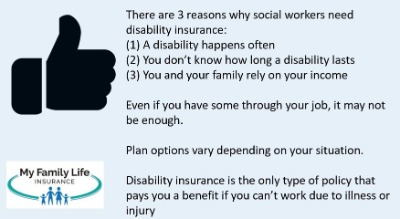
Sounds great. First, though, let’s discuss the characteristics that make a strong policy.
You see, there are many policies that offer limited benefits.
You don’t want to mess with those policies. The worst thing that could happen is you file a claim, expect a payout, and don’t receive one.
So, let’s first discuss the basic elements needed in any disability insurance policy for social workers. We will then discuss additional insurance options and riders.
Disability Insurance Basics – The Elimination Period And Benefit Period
I speak to social workers about disability insurance every day. There are 2 major sources of confusion that these professionals hear from elsewhere. These confusing components are essentially “the basics”, but if you get these wrong, you could be in for a surprise when it comes time to make a claim.
The first is the waiting period or elimination period. In terms of disability insurance, it is not the period of time before your policy is in effect. That is correct for other types of insurance, but not for disability insurance.
The elimination period is the length of time – a waiting period – that elapse before you are eligible for disability benefits. It happens upon a claim. For example, a 90-day elimination period means your benefit period begins after 90 days of disability. On the 91st day, you are eligible for benefits. Typically, you receive your first benefit 30 days after that.
This means you need to have adequate savings to carry you and your family until benefits begin.
The second is the benefit period. The benefit period starts when you are eligible for benefits and lasts until the end of the benefit period or if you return back to work, whichever occurs first. It is not the maximum timeframe that your policy exists. As long as you pay the premiums, you will have the policy until age 65 or 66 – at retirement age.
Typically, the maximum benefit period for social workers is to age 67.
Remember, the average disability claim is 35 months (internet stats) or the 18-24 months (from claims departments). So, even a 5 year benefit period works.
3 Provisions That Make A Formidable Plan
If you spend premiums on a disability insurance policy, you want to make sure you get paid.
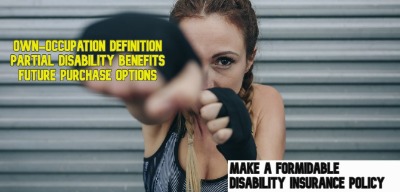 In my opinion, there are 3 disability insurance provisions that make a formidable plan.
In my opinion, there are 3 disability insurance provisions that make a formidable plan.
I call these “non” negotiables. Let’s discuss these now.
#1 The Definition Matters
The definition of disability matters. You generally want some type of “own occupation” definition. However, I will explain more later.
There are two “degrees” of the own occupation definition: “true” own occupation and the “modified” own occupation definition. (There are other own occupation definitions, but these are the two most common.)
Here’s what they each mean. The “true” own-occupation definition means:
- you will receive a disability benefit based on your inability to do your job (as a social worker), AND
- also, work simultaneously in another job for an earned income (should you decide you can).
In other words, you can continue to work in another occupation while receiving disability benefits for the inability to do your job as a personal trainer.
So, if you can’t use your hands, but you can greet people at Walmart, you will receive disability benefits in addition to your earnings as a Walmart greeter.
Modified own occupation is a bit different. You will receive a disability benefit based on your inability to do your job. However, you can’t work in another job. So, if you worked as a Walmart greeter, you won’t receive disability benefits under the modified own occupation definition. This is a good definition, too.
Be Aware Of The Any Occupation Definition
Finally, there is the stringent “any” occupation definition. This means, simply, if you can work in any gainful occupation (for which you are reasonably suited, considering your education, training, and experience), the carrier denies your benefits. So, under this definition, you won’t receive a disability benefit based on your education and experience as a social worker because the insurance carrier says you can work as a Walmart greeter.
Do you want this definition? As a social worker, possibly. If your job is meeting patients at your office, then the “any” occupation might work.
However, let’s say you have a long-term problem with your left wrist or arm because of work repetition. Can you do another job? If you can, the any occupation won’t pay a benefit.
Personally, I always like to play it safe and have clients’ policies contain the “modified” own occupation definition.
#2 Residual / Partial Disability Benefits
This rider will pay a benefit if you return to work in your occupation, and you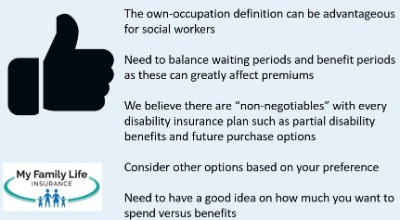 experience an income loss of 20% or more compared to your pre-disability income. Usually, the amount of disability income you receive is a percentage of your total monthly disability benefit. For example, let’s say you return to work and experience a 40% income loss. If your monthly disability benefit is $4,000, you will receive $1,600 ($4,000 X 40%).
experience an income loss of 20% or more compared to your pre-disability income. Usually, the amount of disability income you receive is a percentage of your total monthly disability benefit. For example, let’s say you return to work and experience a 40% income loss. If your monthly disability benefit is $4,000, you will receive $1,600 ($4,000 X 40%).
Why would you need this rider? Most disability insurance policies allow partial disability benefits upon total disability first. This means if you are only partially disabled (i.e. you can still work but not full-time), you will not receive any benefits until you have met the carrier’s requirements for total disability first. But, you are partially disabled, not totally disabled. Without this rider, you won’t receive any partial disability benefits until you have met the total disability requirements first. Ugh!
Typically, this rider circumvents the total disability requirement and allow you to receive benefits immediately (after you satisfy the elimination period).
Here is a very easy example. You lose feeling in your wrists and fingers. The doctor says you need to rest and limits your work to 2 days per week. Without this rider – or a plan that has a partial benefit without a total disability requirement first – you would not receive any disability benefits because you are still working.
#3 Guaranteed Purchase Option
This option allows you to obtain the coverage you need now with the option to purchase additional coverage in the future without evidence of good health. You just need to show your salary or self-employed income increased (through a W-2 or your tax return).
In other words, you can buy more disability insurance as your salary grows (subject to carrier income and coverage limits) with no underwriting?
How great is that?
You can develop type 2 diabetes, develop RA, or get hurt. You can still buy more disability insurance.
This option allows additional coverage every 2 years up to age 55. (You do not need to wait 2 years if you had a life change, defined as a marriage, the death of a spouse, divorce, or birth or adoption of a child. Instead, within 3 months of a life change, you may purchase additional coverage.)
Optional Disability Insurance Riders For Social Workers
After these 3 provisions, you can customize your policy any way you want. There are many disability insurance riders available.
Like purchasing options in a new car, purchasing riders increases the cost of your policy.
That doesn’t mean it is a bad thing. You just want to make sure it fits your needs.
You can add optional riders at an additional cost to your policy to best fit your needs and budget. Some popular rider options for social workers include:
- Retroactive injury benefit
- Mental/nervous benefit for the duration of the benefit period
- Catastrophic disability benefit
Contact us or review our article on disability insurance riders. We will be happy to answer any questions you have.
Disability Insurance Underwriting For Social Workers
It’s important to understand how disability insurance carriers underwrite your application.
Oh, I just went through the life insurance process. I know how it works, you say.
Great. But, disability insurance underwriting is completely different.
Carriers aren’t insuring your mortality. They are insuring your morbidity. In other words, the risk of a disabling accident or illness and paying you a percentage of your salary.
So, carriers look at the following attributes in an application.
When it comes to underwriting, carriers look at your:
- Age
- Health
- Income / Salary
- Occupation
- Other hazards and lifestyle situations
Underwriting Specifics For Social Workers
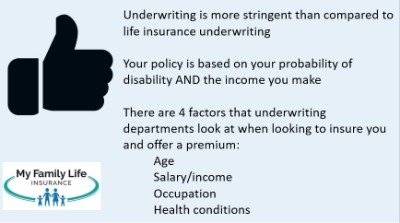 Age is a factor. The older you are, the more expensive the policy – all things being equal, of course. This is why you want to start your policy as soon as possible.
Age is a factor. The older you are, the more expensive the policy – all things being equal, of course. This is why you want to start your policy as soon as possible.
Obviously, your health matters. If you have a chronic illness or had a severe injury in the past, likely that illness or injury won’t be covered. Additionally, carriers can limit benefits based on any health conditions. For example, if you take any anxiety or depression medication, nearly all the carriers limit the waiting period to a minimum of 90 days.
As we mentioned before, carriers insure a percentage of your salary. This percentage is usually 60% of your gross salary.
Your occupation matters as well. All the disability insurance carriers classify your occupational disability risk. The classification table is usually a 1 to a 5 (or 6 with some carriers). An occupation with a class 1 is the riskiest while an occupation with a class 5 is the least. For example, carriers classify a construction laborer at a 1 and an accountant at a 5.
Usually, carriers classify the social worker occupation at a class 2 or class 3. Sometimes, higher classifications are available. We work with one that classifies at a class 5.
Finally, carriers also consider other situations and lifestyle choices like hazardous hobbies. Do you like to rock climb or use marijuana? If so, that hobby will be excluded from your policy.
What Do The Carriers Do With The Information?
The underwriters review all this information and make an approval decision or not. They routinely look up your medical background in the MIB, prescription drug databases, driving records, tax records, etc.
As we discussed, certain situations may limit benefits, benefit periods, and/or waiting periods. They may also increase premiums to compensate for an increased disability risk. For example, if you use marijuana, some carriers will rate your policy (i.e. increase the premiums).
Nevertheless, if your benefits are modified in any way, it still makes sense to purchase the policy. We discuss more in our disability insurance underwriting guide.
The Best Disability Insurance For Social Workers
You are probably wondering who we like to work with. First, we work with many disability insurance carriers. So, we are sure we can find one that meets your needs and budget.
 However, not all carriers insure social workers the same. Look at this snapshot out of an underwriting guide of a popular carrier. They classify the social worker occupation at a class 3 for office duties only and ineligible for disability insurance if you do field work.
However, not all carriers insure social workers the same. Look at this snapshot out of an underwriting guide of a popular carrier. They classify the social worker occupation at a class 3 for office duties only and ineligible for disability insurance if you do field work.
The carriers we like insure the social worker occupation at a class 5 and will cover social workers who have field duties. Moreover, there is no limitation of benefits.
Additionally, the carriers we like all have the:
- Own-occupation definition
- Partial disability benefits
- Guaranteed purchase options
And, additional options as we discussed. Moreover, the plans we like offer value-added benefits like retraining programs.
If you are Christian, we also work with a carrier dedicated to practicing Christians.
Contact us if you would like to learn more. We are happy to chat with you. Since we work with so many disability insurance carriers, I am sure we can find a carrier that meets your needs and budget.
Be careful of blindly applying online without knowing what you are getting yourself into. Buying directly online, currently, is the wrong way to buy disability insurance. Why? As we illustrated earlier, there are so many moving parts with disability insurance.
Group Disability Insurance Available As Well
We also work with a good carrier on the group disability insurance side. The carrier we like offers both short-term disability insurance and long-term disability insurance at guaranteed issue starting at 2 employees.
Rates are reasonable. The disadvantage? Like all group disability insurance, the plan is “plain vanilla” to meet the needs of everyone.
They also accept husband and wife businesses as well as family businesses. We have insured several family-owned businesses with group insurance.
If you are a self-employed social worker with employees, then this group insurance is an option.
Disability Insurance Through National Association Of Social Workers
If you belong to the National Association of Social Workers (NASW), then you are aware of the long-term disability insurance available to members. In our opinion, the insurance program is neither good nor bad. It has a few advantages and many disadvantages. The Hartford underwrites the insurance. The Hartford underwrites many association disability insurance programs.
Nearly all disability insurance policies offered through associations are on a group basis. This isn’t a bad thing. It keeps your cost low.
However, association disability insurance programs tend to be “plain vanilla”, which means they are simple and basic in nature and may not meet your specific needs. Additionally, because of the simplicity, they tend to be lower in cost as well.
Benefits of the NASW disability insurance include:
- Low monthly rates – we’ll get into why. The rates are cheap.
- Can add a spouse or partner
- Easy application
- Replacement of up to 75% of your income
- Own occupation definition
There are some disadvantages, though, which bear some detail. We discuss those next.
Disadvantages Of The NASW Disability Insurance Plan
As we mentioned, association disability insurance plans tend to be plain vanilla. They have to be to keep costs low and appease the members. A low-cost plan doesn’t mean it is right for you.
Below are some disadvantages of the NASW disability insurance plan:
Integrates with social insurance – one reason why the plan is cheap is that it integrates with social security or any other benefits you receive. Although the plan allows 75% replacement of your income, likely any disability benefits you receive are reduced by other insurance benefits.
No “true” partial disability benefit – in our opinion, this is a significant exclusion. Many long-term disabilities start out as partial. That is, you can work, but not full-time.
Does this happen? More than you think. Think about this scenario:
Your doctor diagnoses you with multiple sclerosis. She advises you to slow down and focus on treatments for the next year. This is a partial disability. You can still work – and plan to – but just not full-time. Under the NASW disability insurance, you would not receive any benefits because you need to be totally disabled first. Yet, you aren’t making as much as before because you are not working full-time. That stinks!
No additional benefits for self-employed social workers – many carriers offer additional benefits for self-employed social workers. These additional benefits may include a class upgrade or additional monthly benefits.
Doesn’t appear the own occupation is a true own occupation – this isn’t a significant disadvantage as the NASW disability insurance has an own occupation definition, just not true. True Own Occupation definition allows you to work in another occupation while receiving disability insurance benefits.
Is the NASW disability insurance plan right for you? Maybe. We think the disadvantages outweigh the benefits and cost savings.
What If You Own Your Business?
Are you a business owner or a self-employed social worker? If so, you have an advantage.
You can enroll in a policy that will pay your business expenses upon a disability. The policy is called a business overhead expense policy.
There are many advantages of a business overhead expense insurance policy.
First, premiums are tax-deductible. How great is that?
Second, if structured properly, benefits are tax-free as well.
Finally, the premiums are usually inexpensive.
This type of policy will ensure your business remains solvent during your inability to work from a disability. This is an additional reason why social workers need disability insurance. Contrast this policy with a traditional disability insurance which pays a percentage of your income.
Carriers who offer this type of insurance typically offer a discount on an individual disability insurance policy. Additionally, we only work with carriers that offer an occupation upgrade as well, which means lower premium cost, all things being equal.
How Much Does Disability Insurance Cost Social Workers?
After all of this, how much does disability insurance cost for social workers? That’s the $1,000,000 question. Well, the premiums you pay are a function of everything we discussed above.
However, disability insurance is not incredibly expensive.
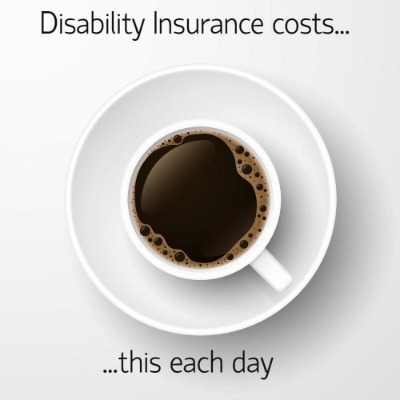 Depending on your situation, disability insurance costs between $1.00 and $4.00 per day. Sometimes it is more; sometimes it is less.
Depending on your situation, disability insurance costs between $1.00 and $4.00 per day. Sometimes it is more; sometimes it is less.
The cost is about the cost of a cup of coffee at your favorite coffee shop.
If you can afford a cup of coffee, or lunch, you can certainly afford disability insurance.
For example, a woman aged 40, making $75,000 annually (net income) could have a $4,700 monthly benefit, own-occupation definition policy for around $122 per month or a little over $4.00 per day.
Think about what you spend each day. You can definitely afford disability insurance.
Now You Know The Best Disability Insurance For Social Workers
We hope now you understand disability insurance and have a solid idea why social workers need disability insurance.
We went through disability insurance thoroughly. Confused? Don’t feel that way.
We’re here to help educate you and protect your income and future. Don’t know where to start? Use this disability insurance needs analysis worksheet. Follow the instructions; it is rather easy to fill out (we at My Family Life Insurance try to make understanding insurance easy).
Next, feel free to reach out to us for our assistance or a quote. Or, use the form below. We only work for you, your family, and your best interests only. We have helped many social workers secure the right disability insurance for their specific situation, giving them and their families peace of mind.
Learn More
Are you interested in learning more about the information in this article? Please fill out the form below, and we will email you additional information or give you a call. We always work in your best interest. By entering your information, you are providing your express consent that My Family Life Insurance may contact you via e-mails, SMS, phone calls, or prerecorded messages at any phone number(s) that you provide, even if the number is a wireless number or on any federal or state do-not-call list. Additionally, you understand that calls may be placed using automated technology, and that consent is not a requirement for purchase. Your information will NOT be sold and will remain private. However, you may opt out at any time. We respect your privacy first and foremost. By contacting us, you agree to receive text messages from our number (800) 645-9841. If you no longer wish to receive text messages, you may opt out at any time by replying "STOP".